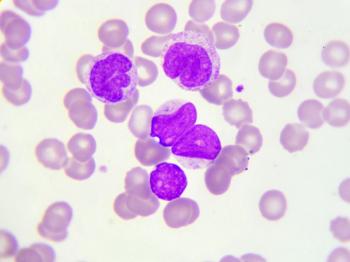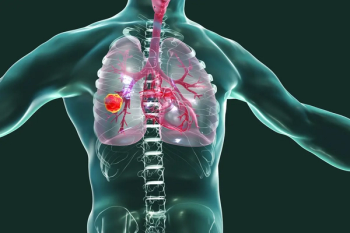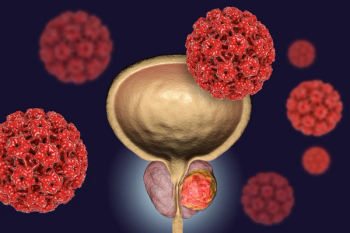
With CAR T-cell therapies showing promise for follicular lymphoma and marginal zone lymphoma, clinicians must weigh toxicity and tolerability almost as strongly as efficacy because patients can live years with these diseases

With CAR T-cell therapies showing promise for follicular lymphoma and marginal zone lymphoma, clinicians must weigh toxicity and tolerability almost as strongly as efficacy because patients can live years with these diseases

With COVID-19 vaccination clinics still operating and booster doses on the horizon, there continues to be a need for pharmacy technicians as immunizers well into the future.

Lola Fashoyin-Aje, MD, MPH, associate director of Science & Policy Program to Address Disparities at the FDA’s Oncology Center of Excellence, discusses the importance of promoting inclusion of members of racial and ethnic minority groups in cancer drug trials.

The European Association of Neuro-Oncology and the European Society for Medical Oncology published recommendations related to parenchymal brain metastases.

Dupilumab (Dupixent) was approved in 2017 for the treatment of adults with moderate-to-severe atopic dermatitis whose disease is not adequately controlled with topical prescription therapies.

The research team analyzed the associations between maternal diabetes before or during pregnancy and the risk of high refractive error (RE), which are conditions in which there is a failure of the eye to properly focus images on the retina.

New artificial intelligence tool can identify tumors at a 97% rate, a year before other methods can diagnose it.

Results from POSEIDON, a randomized open label, phase 3 trial, showed that patients administered 5 cycles of tremelimumab plus durvalumab and chemotherapy over 16 weeks experienced a 23% reduction in the risk of death compared with various chemotherapy options.

Results of a new study show that the vaccines seldomly reach the area that were heavily affected by the pandemic, because of ethnic, racial, and socioeconomic disparities.

Study suggests potentially expanding the use of immunotherapies in the elderly, a population in whom these therapies may be under-prescribed.

Parents are encouraged to either get all immunizations in one health care facility or have a card that documents all the immunizations the child has received.

The Pharmacy Quality Alliance developed the “Medication Access Framework for Quality Measurement” to address the social determinants of health that hinder patient medication access and contribute to poor health outcomes.

The results of a new study show that when coronavirus-infected diabetic mice were injected with an interferon beta, SETDB2 increased and helped decrease the inflammatory cytokines.

Six-point plan outlines strategies to increase national vaccination rates, keep schools open, increase testing and masking access, and to relieve health systems that are overrun with COVID-19 patients.

The efficacy of pirtobrutinib does not depend on prior therapy, reason for prior BTK inhibitor discontinuation, or C481 mutation status, according to the presentation.

Calibrations for the European Randomized Study on Prostate Cancer and Prostate Cancer Prevention Trial predictors can forecast cases across different groups than originally targeted.

Because asparaginase is used exclusively in ALL, most adult oncologists do not administer it routinely.

Empagliflozin demonstrated a 21% relative risk reduction for the composite primary endpoint of cardiovascular death or hospitalization for heart failure, compared with placebo.

Investigators used a new animal model to determine how the stem-like T cell can survive and what it looks like over the course of several months of tumor growth.

Concepts could be used in payer-pharmacy value-based arrangements.

A new study explores why individuals who suffer most from the condition have the worse symptoms at night.

Racial or ethnic discrimination can appear in many ways, even as discrimination against someone based on their accent.

Prostate cancers grow slowly and rarely cause any health problems, so without regular screening, it is more difficult to identify any cancer in the prostate.

Vaccines help prevent pneumococcal disease, which is any type of illness caused by Streptococcus pneumoniae bacteria.

Pharmacists can be instrumental in reducing the main challenges in opioid use disorder—namely supply, demand, and harm.

The results of a new study show a new view of genetic regulation by uncovering how genes and disease are related.

Although the cardiovascular condition was thought to be benign, the disease could put pregnant women at greater risk for serious complications during childbirth.

Ado-trastuzumab (Kadcyla, Genentech) was approved by the FDA in 2019 for the adjuvant treatment of patients with human epidermal growth factor receptor 2-positive early breast cancer.

Study results show that blood and urine exams can potentially pinpoint and track bladder malignancies and nerve tumors.

Nearly 20% of patients with multiple myeloma have a form of the disease in which they make high quantities of a component of monoclonal proteins, which damages the kidneys.